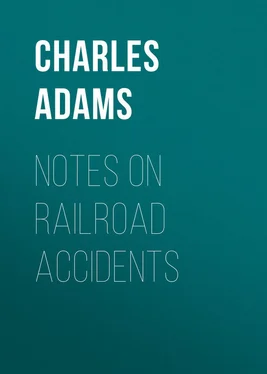Charles Adams - Notes on Railroad Accidents
Здесь есть возможность читать онлайн «Charles Adams - Notes on Railroad Accidents» — ознакомительный отрывок электронной книги совершенно бесплатно, а после прочтения отрывка купить полную версию. В некоторых случаях можно слушать аудио, скачать через торрент в формате fb2 и присутствует краткое содержание. Жанр: foreign_antique, foreign_prose, на английском языке. Описание произведения, (предисловие) а так же отзывы посетителей доступны на портале библиотеки ЛибКат.
- Название:Notes on Railroad Accidents
- Автор:
- Жанр:
- Год:неизвестен
- ISBN:нет данных
- Рейтинг книги:4 / 5. Голосов: 1
-
Избранное:Добавить в избранное
- Отзывы:
-
Ваша оценка:
- 80
- 1
- 2
- 3
- 4
- 5
Notes on Railroad Accidents: краткое содержание, описание и аннотация
Предлагаем к чтению аннотацию, описание, краткое содержание или предисловие (зависит от того, что написал сам автор книги «Notes on Railroad Accidents»). Если вы не нашли необходимую информацию о книге — напишите в комментариях, мы постараемся отыскать её.
Notes on Railroad Accidents — читать онлайн ознакомительный отрывок
Ниже представлен текст книги, разбитый по страницам. Система сохранения места последней прочитанной страницы, позволяет с удобством читать онлайн бесплатно книгу «Notes on Railroad Accidents», без необходимости каждый раз заново искать на чём Вы остановились. Поставьте закладку, и сможете в любой момент перейти на страницу, на которой закончили чтение.
Интервал:
Закладка:
As long ago as the year 1857, in consequence of two accidents to trains by fires, a circular on this subject was issued to the railway companies by the Board of Trade, in which it was stated that "from the beginning of the year 1854, down to the present time (December, 1857) there have been twenty-six cases in which either the accidents themselves or some of the ulterior consequences of the accidents would probably have been avoided had such a means of communication existed." 1 1 The bell-cord in America, notwithstanding the theoretical objections which have been urged to its adoption in other countries, has proved such a simple and perfect protection against dangers from inability to communicate between portions of trains that accidents from this cause do not enter into the consideration of American railroad managers. Yet they do, now and again, occur. For instance, on February 28, 1874, a passenger coach in a west-bound accommodation train of the Great Western railroad of Canada took fire from the falling of a lamp in the closet at its forward end. The bell-cord was for some reason not connected with the locomotive, and the train ran two miles before it could be stopped. The coach in question was entirely destroyed and eight passengers were either burned or suffocated, while no less than thirteen others sustained injuries in jumping from the train.
As none of these accidents had resulted in any considerable number of funerals the railway managers wholly failed to see the propriety of this circular, or the necessity of taking any steps in consequence of it. As, however, accidents from this cause were still reported, and with increasing frequency, the authorities in July, 1864, again bestirred themselves and issued another circular in which it was stated that "several instances have occurred of carriages having taken fire, or having been thrown off the rails, the passengers in which had no means of making their perilous situation known to the servants of the company in charge of the train. Recent occurrences also of a criminal nature in passenger railway trains have excited among the public a very general feeling of alarm." The last reference was more particularly to the memorable Briggs murder, which had taken place only a few days before on July 9th, and was then absorbing the public attention to the almost entire exclusion of everything else.
As no better illustration than this can be found of the extreme slowness with which the necessity for new railroad appliances is recognized in cases where profit is not involved, and of the value of wholesale slaughters, like those at Shipton and Angola, as a species of motive force in the direction of progress, a digression on the subject of English accidents due to the absence of bell-cords may be not without value. In the opinion of the railway managers the cases referred to by the Board of Trade officials failed to show the existence of any necessity for providing means of communication between portions of the train. A detailed statement of a few of the cases thus referred to will not only be found interesting in itself, but it will give some idea of the description of evidence which is considered insufficient. The circumstances of the Briggs murder, deeply interesting as they were, are too long for incidental statement; this, however, is not the case with some of the other occurrences. For instance, the Board of Trade circular was issued on July 30th; on July 7th, a year earlier, the following took place on the London & North Western road.
Two gentlemen took their seats at Liverpool in one of the compartments of the express train to London. In it they found already seated an elderly lady and a large, powerfully built man, apparently Irish, respectably dressed, but with a lowering, suspicious visage. Though one of the two gentlemen noticed this peculiarity as he entered the carriage, he gave no thought to it, but, going on with their conversation, he and his friend took their seats, and in a few moments the train started. Scarcely was it out of the station when the stranger changed his seat, placing himself on the other side of the carriage, close to the window, and at the same time, in a menacing way, incoherently muttering something to himself. The other passengers looked at him, but felt no particular alarm, and for a time he remained quietly in his seat. He then suddenly sprang up, and, with a large clasp-knife in his hand, rushed at one of the gentlemen, a Mr. Warland by name, and struck him on the forehead, the knife sliding along the bone and inflicting a frightful flesh wound. As he was in the act of repeating the blow, Warland's companion thrust him back upon the seat. This seemed to infuriate him, and starting to his feet he again tried to attack the wounded man. A frightful struggle ensued. It was a struggle for life, in a narrow compartment feebly lighted, for it was late at night, on a train running at full speed and with no stopping place for eighty miles. The passenger who had not been hurt clutched the maniac by the throat with one hand and grasped his knife with the other, but only to feel the blade drawn through his fingers, cutting them to the bone. The unfortunate elderly woman, the remaining occupant of the compartment, after screaming violently in her terror for a few moments, fainted away and fell upon the floor. The struggle nevertheless went on among the three men, until at last, though blinded with blood and weak from its loss, the wounded Mr. Warland got behind his assailant and threw him down, in which position the two succeeded in holding him, he striking and stabbing at both of them with his knife, shouting loudly all the time, and desperately endeavoring to rise and throw them off. They finally, however, got his knife away from him, and then kept him down until the train at last drew up at Camdentown station. When the ticket collector opened the compartment door at that place he found the four passengers on the floor, the woman senseless and two of the men holding the third, while the faces and clothing of all of them, together with seats, floor, windows and sides of the carriage were covered with blood or smeared with finger marks.
The assailant in this case, as it subsequently appeared upon his commitment for an assault, was a schoolmaster who had come over from Ireland to a competitive examination. He was insane, of course, but before the magistrate he made a statement which had in it something quite touching; he said that he saw the two gentlemen talking together, and, as he thought, making motions towards him; he believed them to be thieves who intended to rob him, and so he thought that he could not do better than defend himself, "if only for his dear little ones at home."
This took place before the Board of Trade circular was issued, but, as if to give emphasis to it, a few days only after its issue, in August, 1864, there was a not dissimilar occurrence in a third class carriage between London and Peterborough. The running distance was in this case eighty miles without a stop, and occupied generally an hour and fifty minutes, – the rate being forty-three miles an hour. In the compartment in question were five passengers, one of whom, a tall powerful fellow, was dressed like a sailor. The train was hardly out of London when this man, after searching his pockets for a moment, cried out that he had been robbed of his purse containing £17, and began violently to shout and gesticulate. He then tried to clamber through the window, getting his body and one leg out, and when his fellow passengers, catching hold of his other leg, succeeded in hauling him back, he turned savagely upon them and a desperate struggle ensued. At last he was gotten down by main force and bound to a seat. Meanwhile, notwithstanding the speed at which they were running, the noise of the struggle was heard in the adjoining compartments, and almost frantic efforts were made to stop the train. Word was passed from carriage to carriage for a short distance, but it proved impossible to communicate with the guard, or to do anything but thoroughly alarm the passengers. These merely knew that something was the matter, – what, they could only imagine, – and so the run to Peterborough was completed amid shouts of "stop the train," interspersed with frantic female shrieks. The man was suffering from delirium tremens .
Читать дальшеИнтервал:
Закладка:
Похожие книги на «Notes on Railroad Accidents»
Представляем Вашему вниманию похожие книги на «Notes on Railroad Accidents» списком для выбора. Мы отобрали схожую по названию и смыслу литературу в надежде предоставить читателям больше вариантов отыскать новые, интересные, ещё непрочитанные произведения.
Обсуждение, отзывы о книге «Notes on Railroad Accidents» и просто собственные мнения читателей. Оставьте ваши комментарии, напишите, что Вы думаете о произведении, его смысле или главных героях. Укажите что конкретно понравилось, а что нет, и почему Вы так считаете.












